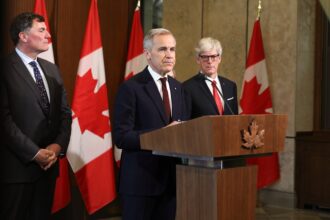Beneath the polite smiles and apologetic tendencies lies a more complex truth about Canadian happiness. A comprehensive new national survey has revealed striking regional disparities in life satisfaction across the country, challenging long-held assumptions about which provinces truly offer the highest quality of life.
The 2024 Canadian Happiness Index, released yesterday by the National Institute for Social Research, shows Atlantic Canada continuing its surprising dominance of happiness metrics, with Newfoundland and Labrador claiming the top position for the third consecutive year. Meanwhile, Ontario—despite housing the nation’s financial hub and capital—finds itself languishing near the bottom of provincial rankings.
“What we’re seeing reflects a fundamental shift in how Canadians define wellbeing,” explains Dr. Sarah Carmichael, lead researcher for the study. “The traditional markers of success—high salaries and urban amenities—are being outweighed by community connection, work-life balance, and housing affordability.”
The survey, which polled over 12,000 Canadians across all provinces and territories, measured happiness through multiple indicators including financial security, sense of community, health outcomes, and overall life satisfaction. Atlantic provinces dominated the top rankings, with Newfoundland (8.2/10), Prince Edward Island (8.1), and Nova Scotia (7.9) forming the happiest region in the country.
Perhaps most surprising is British Columbia’s middling performance (7.5), despite its natural beauty and mild climate. Researchers attribute this to the province’s housing affordability crisis and growing urban isolation, particularly in Vancouver.
“The data challenges our assumptions about what makes Canadians happy,” notes social economist Patrick Nguyen from the University of Toronto. “Provinces with lower costs of living and stronger community bonds consistently outperform those with higher incomes but greater social isolation.”
The happiness gap appears particularly pronounced between rural and urban populations. While metropolitan centers offer more economic opportunities, the survey indicates rural residents report significantly higher life satisfaction scores despite lower average incomes. This rural-urban divide was most extreme in Ontario, where Toronto residents reported the lowest happiness scores (6.8) of any major Canadian city.
Quebec’s distinctive social policies appear to be paying dividends in citizen happiness. The province ranked fourth overall (7.8), with researchers highlighting its affordable childcare program and work-life balance protections as significant contributors to wellbeing.
The economic impact of happiness cannot be overlooked. According to parallel research from the Canadian Economic Council, provinces with higher happiness scores show lower healthcare utilization rates, higher productivity, and better employee retention—suggesting happiness is not merely a social metric but an economic indicator worth tracking.
“Happiness isn’t just a nice-to-have,” explains economist Marianne Chen. “Our data shows that happiness correlates with tangible economic benefits including reduced healthcare costs and increased productivity.”
The findings have profound implications for Canadian policy at both provincial and federal levels. Researchers recommend policymakers prioritize affordable housing, community development, and mental health services to address happiness deficits, particularly in urban centers.
For provinces at the bottom of the rankings—Alberta (7.2), Manitoba (7.0), and Ontario (6.9)—the results offer a sobering wake-up call about quality of life. These provinces now face difficult questions about whether economic growth strategies have come at the expense of citizen wellbeing.
As Canada navigates post-pandemic recovery and economic uncertainty, this happiness research offers valuable insights into what truly matters to citizens. The question now facing policymakers and communities alike: in our pursuit of prosperity, have we overlooked the fundamental elements that make Canadians truly happy?

























